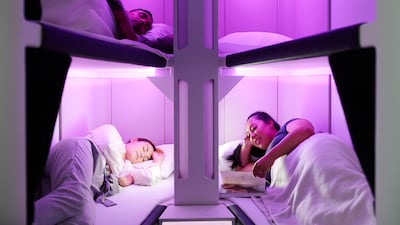Travellers hoping for a glimpse into what catching a flight might be like in the future, can take a look at the newly announced shortlist for the 2023 Crystal Cabin Awards.
Lie-flat bunk beds in economy class, AI-powered in-flight meal services and a number of new designs for vertical flying vehicles were among more than 80 entries shortlisted for the 2023 accolade.
Serving as an indicator of what could be in the skies in the future, the Crystal Cabin Awards are seen as the "Oscars" of aviation design, with winners being announced in June in Hamburg during the Aircraft Interiors Expo.
Highlighting some of the best new designs in the world of aviation, this year's shortlist feature concepts from airlines, aviation companies, design studios and students.
Among the nominees is Air New Zealand’s previously announced Skynest, a lie-flat bed for passengers flying in economy class. Designed for use on long-haul flights, the design includes a sleep pod island in the middle of the aircraft — travellers can book four-hour time slots to take a nap in the pod. The design is in the works and will be introduced next year.
Premium economy travellers on long routes can also get an upgrade, if Paradym and Life Aero Design’s proposal takes flight. Their "smarter seating" design includes wider seats, twin armrests and fully flexible rows where cushions can be elevated to create lie-flat beds. Concepts have been designed in a range of colours inspired by destinations around the world, including Singapore green and Icelandic grey.
Lufthansa Group’s new cabins will also be rolled out across the German fleet from autumn this year, and the Allegris design is another Crystal Cabin shortlisted entry. Travellers in economy class will have more legroom, while premium passengers can book suites with double beds and fly on temperature-controllable heated or cooled seats.

In-flight meals could also be changing if Lufthansa Industry Solutions's Food Waste App goes mainstream. Using AI, the technology records what passengers leave on their trays, using the data to make suggestions for catering plans on subsequent flights.
And it's not only commercial planes ranking in this year’s shortlist. More designs for vertical take-off and landing aircrafts than ever before have been nominated, including Hyundai Transys’s sleek air taxi cabin concept. Optimising space and prioritising privacy in a shared cabin, the design also focuses on sustainability through its use of regenerative materials.

German aviation company Lilium's design strides in the opposite direction. The Pioneer Edition Lilium Jet is a seven-seater electric plane with a sleek monochromatic design championing exclusivity and customisable options, including a sky bar and club seats in what's being billed as a "premium shuttle service".
Finally, travellers hoping to conduct business above the clouds will enjoy Skyted’s new noise-cancelling mask. Inspired by facemasks worn during the Covid-19 pandemic, the face covering has been designed in collaboration with Airbus and the European Space Agency and aims to allow silent inflight calls.


